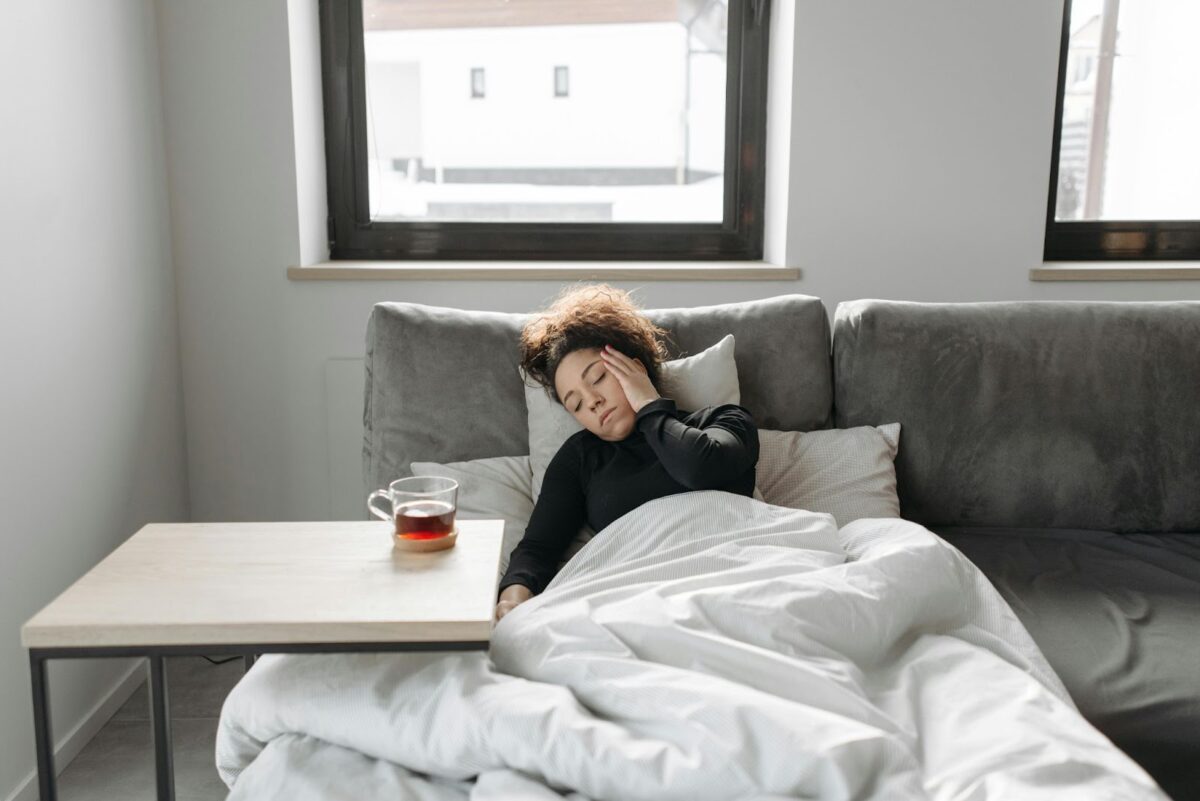Catching a cold is never pleasant, especially when it’s time to turn in for the night. I hate having a cold because it can make falling asleep feel nearly impossible. However, a good night’s sleep is crucial for your immune system’s fight against the virus. But, how to sleep with a cold when you feel very sick?
Today we will look at practical strategies to help you sleep better even with a cold, as we do here at Sleep to always ensure your nights are as restful as possible. Let’s get started!
Cold Symptoms and Causes
The common cold is primarily caused by rhinoviruses that infect the upper respiratory tract. Symptoms include a stuffy or runny nose, sore throat, coughing, and sneezing, all of which are your body’s response to the infection.
Cold symptoms can obstruct your nasal passages, making it difficult to breathe comfortably, which in turn affects your ability to fall asleep.
Symptoms of the Common Cold
- Stuffy or Runny Nose
- Sore Throat
- Coughing
- Sneezing
- Mild Headache
- Body Aches and Mild Fatigue
- Low-grade Fever
Causes and Transmission
The primary cause of the common cold is infection with rhinoviruses. However, other viruses such as coronavirus, respiratory syncytial virus (RSV), and adenoviruses can also cause cold-like symptoms. These viruses are highly contagious and can spread through:
- Airborne Respiratory Droplets
- Direct Contact
- Contaminated Surfaces
Why Do Symptoms Worsen at Night?
Many people find that their cold symptoms become more pronounced at night. This can be due to a combination of factors, including the body’s circadian rhythm affecting the immune response and the gravitational shift that happens when you lie down, which can exacerbate congestion and coughing.
How to Sleep with a Cold

Source: Pexels
Here five tips to help you sleep when you are sick with a cold:
1.Drink a Lot of Water
Staying hydrated is essential when you have a cold. Drinking plenty of water throughout the day loosens mucus, making it easier to breathe. A hydrated body also helps your immune system function more efficiently, speeding up recovery.
2.Take Medication
Over-the-counter pain relievers and anti-inflammatory medications can alleviate symptoms such as sore throat, headache, and fever that may prevent you from falling asleep.
Always follow the recommended dosage and consider any potential interactions with other medications.
Some of the most commonly used medications include:
- Ibuprofen
- Acetaminophen
- Aspirin
3.Grab a Warm Tea
A cup of warm tea before bed can soothe a sore throat and relieve congestion.
Herbal teas, like chamomile, also have natural sedative properties that may help you fall asleep faster.
Here are some of the most effective teas for combating cold symptoms and promoting restful sleep:
- Honey and Lemon Tea
- Chamomile Tea
- Ginger Tea
- Peppermint Tea
- Echinacea Tea
- Licorice Root Tea
When preparing your tea, you can let it steeping for 5 to 10 minutes. You can adjust the strength according to your taste preferences and the severity of your symptoms.
4.Humidify the Room
Dry air can aggravate your symptoms.
Using a humidifier in your bedroom adds moisture to the air, which can help ease breathing through a stuffy nose and soothe irritated throats.
5.Take a Shower
Taking a hot shower before bed can help alleviate cold and flu symptoms. The steam loosens mucus in the nasal passages and relaxes your muscles, making it easier to fall asleep.
Plus, it’s a great way to warm up if you’re feeling chilly.
Frequently Asked Questions
How should you sleep when you have a cold?
Elevating your head with extra pillows can help reduce nasal congestion and make breathing easier. This position helps prevent mucus from blocking your nasal passages.
How do you sleep when it’s cold?
Keep your room at a comfortable temperature and consider using a warm blanket or wearing warmer pajamas. A hot water bottle can also provide warmth and comfort.
Why does a cold get worse at night?
The body’s circadian rhythms can change the way it responds to infections, potentially making symptoms feel more intense at night. Additionally, lying down can increase congestion, making symptoms more noticeable.
What is the best position to sleep when congested?
Sleeping on your side or with your head elevated is generally the best position to reduce congestion and make breathing easier.
While a cold can disrupt your sleep, adopting these strategies can significantly improve your ability to rest. Remember, good sleep is integral to your recovery process.
Keep these tips in mind the next time you’re under the weather, and here’s to hoping for a good night’s sleep, cold or no cold.
Disclaimer: The information provided in this article is for informational purposes only and is not intended to substitute for professional medical advice, diagnosis, or treatment.



